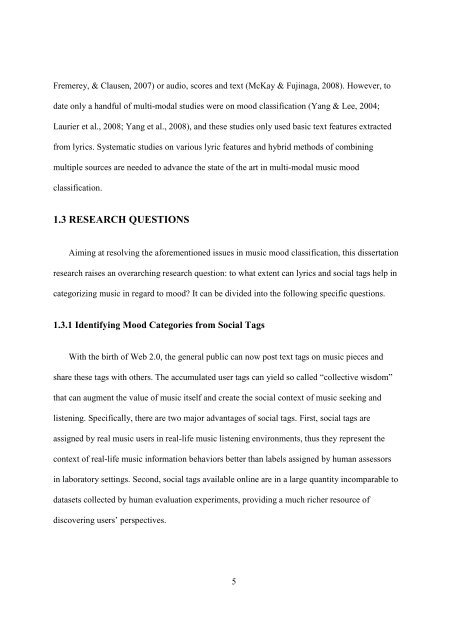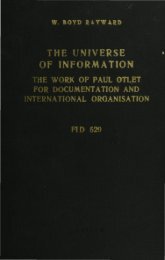improving music mood classification using lyrics, audio and social tags
improving music mood classification using lyrics, audio and social tags
improving music mood classification using lyrics, audio and social tags
Create successful ePaper yourself
Turn your PDF publications into a flip-book with our unique Google optimized e-Paper software.
Fremerey, & Clausen, 2007) or <strong>audio</strong>, scores <strong>and</strong> text (McKay & Fujinaga, 2008). However, to<br />
date only a h<strong>and</strong>ful of multi-modal studies were on <strong>mood</strong> <strong>classification</strong> (Yang & Lee, 2004;<br />
Laurier et al., 2008; Yang et al., 2008), <strong>and</strong> these studies only used basic text features extracted<br />
from <strong>lyrics</strong>. Systematic studies on various lyric features <strong>and</strong> hybrid methods of combining<br />
multiple sources are needed to advance the state of the art in multi-modal <strong>music</strong> <strong>mood</strong><br />
<strong>classification</strong>.<br />
1.3 RESEARCH QUESTIONS<br />
Aiming at resolving the aforementioned issues in <strong>music</strong> <strong>mood</strong> <strong>classification</strong>, this dissertation<br />
research raises an overarching research question: to what extent can <strong>lyrics</strong> <strong>and</strong> <strong>social</strong> <strong>tags</strong> help in<br />
categorizing <strong>music</strong> in regard to <strong>mood</strong>? It can be divided into the following specific questions.<br />
1.3.1 Identifying Mood Categories from Social Tags<br />
With the birth of Web 2.0, the general public can now post text <strong>tags</strong> on <strong>music</strong> pieces <strong>and</strong><br />
share these <strong>tags</strong> with others. The accumulated user <strong>tags</strong> can yield so called “collective wisdom”<br />
that can augment the value of <strong>music</strong> itself <strong>and</strong> create the <strong>social</strong> context of <strong>music</strong> seeking <strong>and</strong><br />
listening. Specifically, there are two major advantages of <strong>social</strong> <strong>tags</strong>. First, <strong>social</strong> <strong>tags</strong> are<br />
assigned by real <strong>music</strong> users in real-life <strong>music</strong> listening environments, thus they represent the<br />
context of real-life <strong>music</strong> information behaviors better than labels assigned by human assessors<br />
in laboratory settings. Second, <strong>social</strong> <strong>tags</strong> available online are in a large quantity incomparable to<br />
datasets collected by human evaluation experiments, providing a much richer resource of<br />
discovering users’ perspectives.<br />
5
















